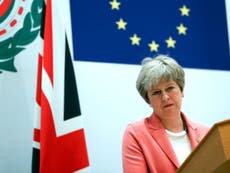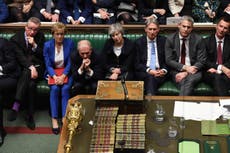A parade of ritual votes solves nothing and leads Britain towards an inevitable Brexit delay
It would be nice to think Theresa May has a plan, and is holding back some clever form of words until the time is right – but all the evidence is against it

By the time MPs voted on Wednesday evening, the drama had been played out. All that was left was the ritual of three votes, the outcomes of which were not in doubt. The Labour and Scottish National Party amendments were defeated, and Yvette Cooper’s amendment, designed to reinforce the timetable for future Brexit votes set out by the prime minister, went through as the government chose not to oppose it.
The drama happened on Tuesday, when Theresa May finally accepted the reality that the House of Commons will block any attempt to take the UK out of the EU without an agreement.
That meant the effort by a cross-party group of backbenchers led by Cooper, Labour chair of the Home Affairs Select Committee, to seize temporary control of the levers of power was no longer needed. There were waspish comments about whether May could be trusted. At Prime Minister’s Questions, Helen Hayes, the Labour MP for Dulwich, asked what guarantee – “other than her word” – the prime minister could give that parliament would be allowed to rule out a no-deal Brexit.
But no one imagines that the prime minister, having given an undertaking at the despatch box, could go back on it. In any case, as Cooper said in a statement issued to lay claim to her victory, “we will be ready to table further amendments if ministers go back on their word”.
So Caroline Spelman, the Tory former cabinet minister, in whose name the critical amendment was tabled, withdrew it and MPs took part in ritual votes along party lines.
The one person who really matters now was not in the chamber. Everyone is now waiting for Geoffrey Cox, the attorney general. He was in Brussels on Tuesday and at some point between now and 12 March he will bring forth a legally binding codicil to the withdrawal agreement, which the prime minister will put to another vote of the Commons.
I doubt that his legal drafting will persuade enough of the Conservative MPs who voted against the deal last time. Or the DUP. Nigel Dodds, the DUP leader in Westminster, did not sound like someone who was expecting to be convinced.
It would be nice to think that the prime minister has a plan, and is holding back some clever form of words until the time is right, when it is too late for parliament to quibble.
But all the evidence so far is that her planning horizon extends no further than the middle of next week. It is getting shorter – sometimes she seems to be just trying to survive the day.
One telling moment was cited by Heidi Allen in an interview after she defected to the Independent Group. According to Allen, when Theresa May addressed Tory MPs in a private meeting before another day of voting on Brexit options a month ago, she rejected demands to support Sir Graham Brady’s amendment to “replace” the Ireland border protocol with “alternative arrangements”. Allen recalled: “And then – I will never forget it – she just threw her hands in the air and went, ‘All right! I’ll whip on it.’ Ministers looked at her in disbelief.”
Many Tory MPs tell me that they think Cox will deliver; the DUP will swing behind the prime minister’s legally revised deal; and most of the Tory Eurosceptic MPs will follow. But that is just a hope, not a plan.
It seems more likely that Cox’s document and his Shakespearean Commons performances will persuade those Tory MPs who are desperate to be persuaded, but that the DUP and a significant proportion of Tories who voted against the deal last month will vote against it again.
If the deal is lost, the Commons would then vote in sequence: against a no-deal Brexit, and for delaying the UK’s departure from the EU.
Many Tory MPs do not seem to realise the significance of this. Jacob Rees-Mogg seems to think a no-deal Brexit would still be possible after a short delay. He must be wrong about that. If the Commons votes to delay once, it will do so again rather than contemplate leaving without a deal.
If the prime minister cannot win the vote on her revised deal, Brexit will be delayed, possibly for ever.







Join our commenting forum
Join thought-provoking conversations, follow other Independent readers and see their replies